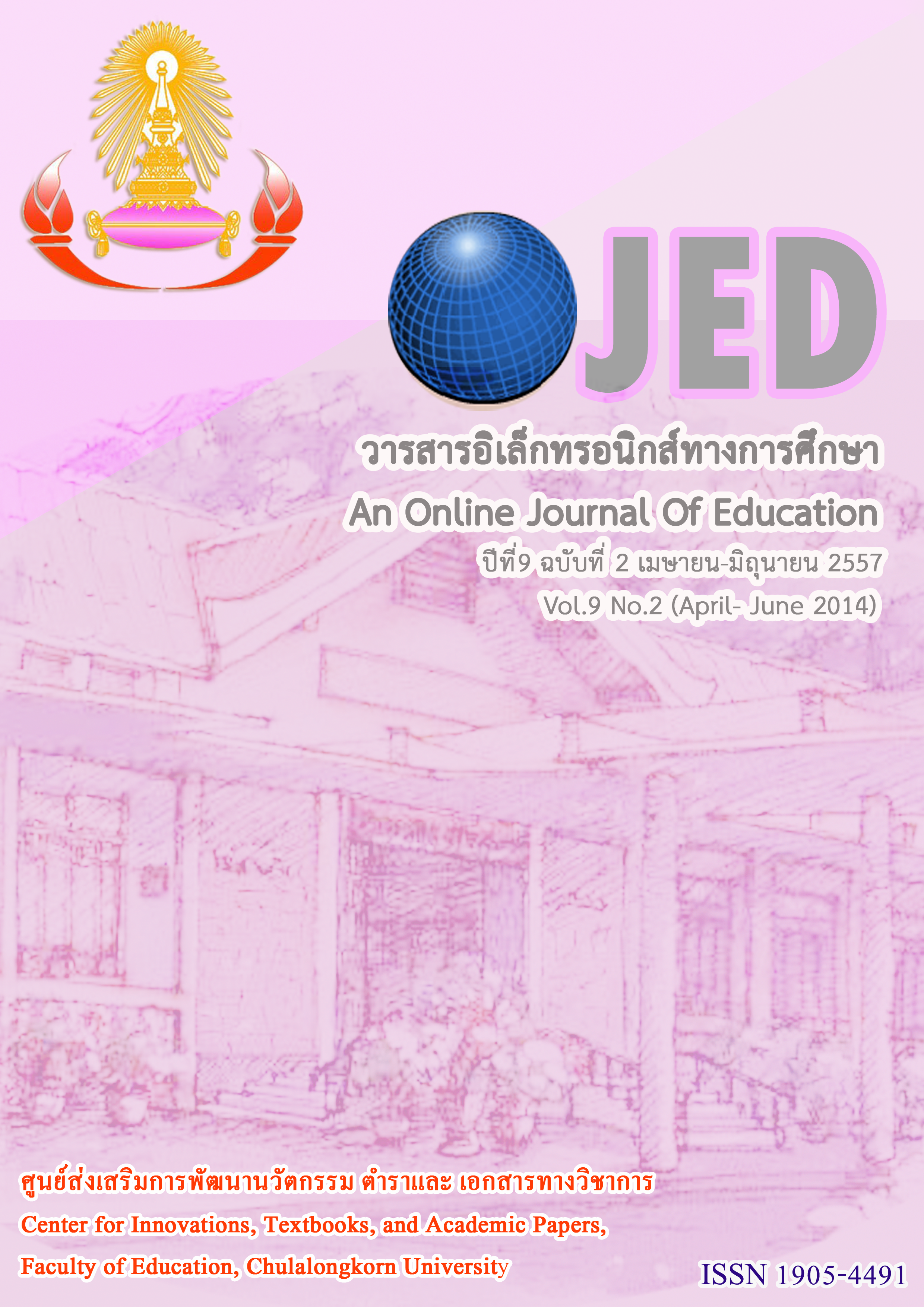ผลของโปรแกรมส่งเสริมสุขภาพตามทฤษฎีความสามารถแห่งตนเพื่อพัฒนาความฉลาดทางอารมณ์ของนักเรียนประถมศึกษา
Keywords:
โปรแกรมส่งเสริมสุขภาพ, ทฤษฎีความสามารถแห่งตน, ความฉลาดทางอารมณ์, HEALTH PROMOTION PROGRAM, SELF-EFFICACY THEORY, EMOTIONAL QUOTIENTAbstract
บทคัดย่อ
การวิจัยครั้งนี้มีวัตถุประสงค์เพื่อศึกษาผลของโปรแกรมส่งเสริมสุขภาพตามทฤษฎีความสามารถแห่งตนเพื่อพัฒนาความฉลาดทางอารมณ์ของนักเรียนประถมศึกษา กลุ่มตัวอย่าง คือนักเรียนประถมศึกษา จานวน 50 คน ที่มีระดับความฉลาดทางอารมณ์อยู่ในระดับต่า แบ่งเป็น 2 กลุ่ม คือ นักเรียนกลุ่มทดลองที่ได้รับการจัดโปรแกรมส่งเสริมสุขภาพตามทฤษฎีความสามารถแห่งตน เป็นเวลา 8 สัปดาห์ สัปดาห์ละ 3 วัน วันละ 1 ชั่วโมง จานวน 25 คน และกลุ่มควบคุมที่ไม่ได้รับการจัดโปรแกรมส่งเสริมสุขภาพ จานวน 25 คน วิเคราะห์ข้อมูลโดยการหาค่าเฉลี่ย ค่าส่วนเบี่ยงเบนมาตรฐาน และทดสอบค่าทีที่ระดับนัยสาคัญทางสถิติที่ระดับ.05
ผลการวิจัยพบว่า 1) โปรแกรมส่งเสริมสุขภาพตามทฤษฎีความสามารถแห่งตนสามารถเพิ่มระดับความฉลาดทางอารมณ์ของนักเรียนประถมศึกษาได้ 2) ค่าเฉลี่ยของคะแนนความฉลาดทางอารมณ์ของนักเรียนกลุ่มทดลองหลังการทดลองสูงกว่าก่อนการทดลอง อย่างมีนัยสาคัญทางสถิติที่ระดับ .05 ค่าคะแนนเฉลี่ยความฉลาดทางอารมณ์ของนักเรียนกลุ่มควบคุมหลังการทดลองต่ากว่าก่อนการทดลอง อย่างมีนัยสาคัญทางสถิติที่ระดับ .05 3) ค่าเฉลี่ยความฉลาดทางอารมณ์หลังการทดลองของนักเรียนกลุ่มทดลองสูงกว่านักเรียนกลุ่มควบคุมอย่างมีนัยสาคัญอย่างมีนัยสาคัญทางสถิติที่ระดับ .05
คำสำคัญ : โปรแกรมส่งเสริมสุขภาพ / ทฤษฎีความสามารถแห่งตน / ความฉลาดทางอารมณ์
Abstract
The purposes of this study were to study the effects of a health promotion program based on self-efficacy theory to develop emotional quotient of elementary school students. The sample was 50 elementary school students with emotional quotient are low. Divided into 2 groups with 25 students in the experimental group that received the health promotion program based on self-efficacy theory for 8 weeks, 3 days a week, 1 hour a day and 25 students in the control group not received the health promotion program. The data were then analyzed by means, standard deviations and t-test that using statistically significant differences at .05 level.
The research findings were as follow: 1) The research finding suggests that health promotion program based on self-efficacy theory was effectively to increase emotional quotient of elementary school students. 2) The mean score of the emotional quotient of the experimental group student after received the health promotion program were significantly higher than before at .05 level. 3) The mean score of the emotional quotient of the experimental group student after received the health promotion program were significantly higher than the control group at the .05 level.
KEYWORDS: HEALTH PROMOTION PROGRAM / SELF-EFFICACY THEORY / EMOTIONAL QUOTIENT



